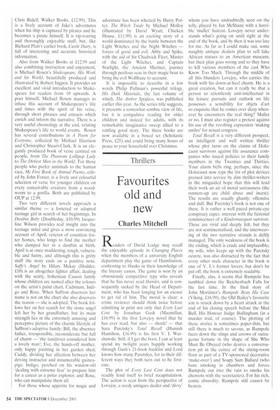Favourites old and new
Charles Mitchell
Readers of David Lodge may recall the enjoyable episode in Changing Places when the members of a university English department play the game of Humiliation, confessing to blanks in their knowledge of the literary canon. The game is won by an obnoxiously competitive type who reveals that he has never read Hamlet, and is consequently sacked by the Head of Department, who has been longing for an excuse to get rid of him. The moral is clear: a crime reviewer should think twice before admitting in print not only that Every Last Cent by Jonathan Gash (Macmillan, £16.99) is the first Lovejoy novel that he has ever read, but also — shock! — that Sara Paretsky's Total Recall (Hamish Hamilton, £16.99) is his first V. I. Warshawski. Still, if I get the boot, I can at least spend my twilight years happily working through Gash's 21-book backlist and Lord knows how many Paretskys, for in their different ways they both turn out to be firstrate.
The plot of Every Last Cent does not readily lend itself to brief recapitulation. The action is seen from the perspective of Lovejoy, a seedy antiques dealer and 'divvy'
whom you have undoubtedly seen on the telly, played by Ian McShane with a horrible 'mullet' haircut. Lovejoy never understands what's going on until right at the end of the book, and by then it was too late for me. As far as I could make out, some naughty antique dealers plan to sell fake African statues to an American museum, but their plan goes wrong and so they have to kill various members of the cast Who Know Too Much. Through the middle of all this blunders Lovejoy, who carries the book with his down-at-heel charm. He is a great creation, but can it really be that a person so relentlessly anti-intellectual in his leisure pursuits and outlook on life possesses a sensibility for objets d'art so exquisite that he comes over dizzy whenever he encounters the real thing? Mullet or no. I must also register a protest against his use of the revolting expression 'making smiles' for sexual congress.
Total Recall is a very different prospect, an intelligent and well written thriller whose plot turns on the claims of Holocaust survivors against life assurance companies who issued policies to their family members in the Twenties and Thirties. Your alarm bells ring, perhaps, since the Holocaust now tops the list of plot devices pressed into service by dim thriller-writers in the misguided hope that this will lend their work an air of moral seriousness (the runners-up are child abuse and incest). The results are usually ghastly: offensive and dull. But Paretsky's book is not one of these. It is rather a well paced private-eye conspiracy caper, intercut with the fictional reminiscences of a Kindertransport survivor. These are vivid and deeply felt, but they are not sentimentalised, and the interweaving of the two narrative strands is deftly managed. The only weakness of the book is the ending, which is crude and implausible; my wife, who keeps up with the Paretsky oeuvre, was also distracted by the fact that every other male character in the book is one of V. Ifs former lovers; but don't be put off, the book is extremely readable.
Finally, alas, it seems that Rumpole has tumbled down the Reichenhach Falls for the last time. In the final story of John Mortimer's Rumpole Rests His Case (Viking, £16.99). the Old Bailey's favourite son is struck down by a heart attack at the end of his closing speech before the Mad Bull, His Honour Judge Bullingham (in a murder trial, of course). The plotting of these stories is sometimes paper-thin, but still there is much to savour, as Rumpole faces down the slings and arrows of outrageous fortune in the shape of She Who Must Be Obeyed (who desires a conversation pit in the centre of the sitting-room floor as part of a TV-sponsored decorative 'make-over') and Soapy Sam Ballard (who bans smoking in chambers and forces Rumpole out into the rain to smoke his cheroots with the secretaries). For his rich, comic absurdity, Rumpole still cannot be beaten.






















































































 Previous page
Previous page